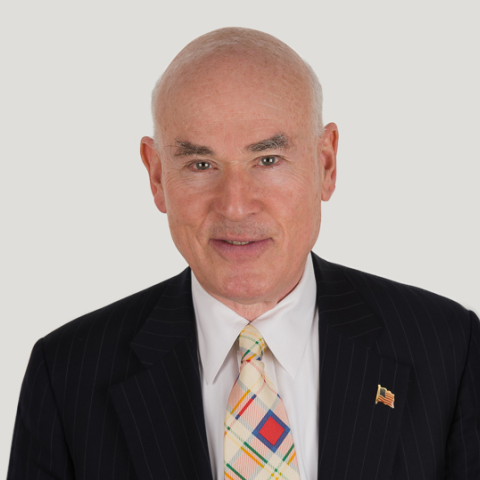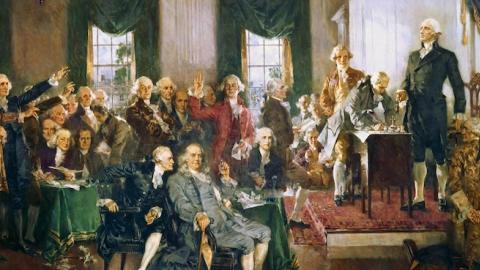On November 8, American voters must answer a question that was before our Founders in 1787: What policies are most likely to assure our continued liberty and prosperity, and which of the candidates is most likely to support and implement those policies?
The Founders of the United States had risked everything — their lives, families, and property — to find a way to vindicate the “self-evident truths” in which they believed: “that all men are created equal, that they are endowed by their Creator with certain inalienable Rights, that among these are Life, Liberty, and the pursuit of Happiness.” It was this profound belief that inspired them to hope that they and their countrymen could better assure the protection of their own liberty and security than the king of England, who had infringed on it. And so they concluded they must “dissolve the political bonds” that had connected them to the king.
The path they took to better preserve their freedoms, their “inalienable rights,” was chosen just over a decade later, when the new Constitution provided for a government of limited powers, chosen by and accountable to the people. Under the new Constitution, the government and its elected leaders themselves were to be restricted in how they could affect the lives of the people, and they themselves were to be ruled by law. As Benjamin Franklin departed from the convention that had fashioned the Constitution, he was asked what sort of government it had created. He famously replied, “A Republic, if you can keep it.” With similar doubt about the likely duration of the new republic, on coming to New York City to be inaugurated as the first president, George Washington said he had accepted the presidency in the hope that his doing so might allow the experiment in self-government, the world’s first government created by a written Constitution, to last as long as 20 years.
As we all know, the Constitution and the government established under it have lasted more than 20 years. In fact, the experiment in self-government that started 229 years ago has succeeded so well in delivering to its people the assurance and reality of liberty and security that it has been emulated around the world by dozens of countries fashioning their own constitutions. However, to revert back to Franklin’s apprehension about the survivability of the republic created in 1787, we may not be able to keep it for much longer.
The principles underlying the 1787 Constitution are being attacked from all directions, at home and abroad. Its domestic opponents and its international opponents have at least one thing in common: They wish to substitute their will, their power, for the rule of law in determining restrictions on how individuals may choose to exercise their “inalienable rights” to pursue “Happiness.”
With the greatest optimism, an optimism that the last 75 years’ experience suggests was unwarranted, the United States and its allies and friends attempted to extend the underlying constitutional principle of the rule of law to the world at large. No matter how successful this has been for the United States, it is plain that important forces around the world do not want to have their affairs and interests so constricted. It is very clear that Russia, China, Iran, and other countries prefer a world in which the strong do as they wish and the weak do as they are told. Some might call this a return to the “law of the jungle.” Like it or not, strong international actors, actors who have been growing stronger each year, are determined to have their ways.
Regrettably, there are also powerful domestic actors who wish to be free of the constraints imposed by the rule of law as envisioned by our Founders under the Constitution. President Obama has inventively and repeatedly attempted to use what he claims is “executive authority” to govern when he believes he cannot persuade Congress to give him legal authority to act. Administrative agencies have acted beyond any legal authority that either Congress or the Constitution has given them, but with the enthusiastic support of many of our political leaders, including our president. And one of the presidential candidates in this year’s election is candidly opposed to deciding conflicts between people and interests through the rule of law, recently saying that “the Supreme Court should represent all of us” by “standing up to the powerful.”
So the rule of law as a device for institutionally ensuring liberty and security is very much under attack, internationally and domestically. In both instances, those who lead the opposition plainly want to substitute raw power — their own power, whether political or military — to decide issues that dramatically affect the life, liberty, and happiness of others. The domestic issue for “We the People,” as it was 229 years ago, is whether we can keep the republic the Founders gave us. How we vote on November 8 may well be determinative.
For my part, I have come to the conclusion that Mr. Trump is likely to support and defend the Constitution and the rule of law, while Mrs. Clinton’s words and actions make it certain that she would undermine both for her political ends. But whoever is elected president, the Republic will be safer if we choose senators and representatives who believe that they and the president are constrained in the exercise of power by the Constitution and constitutional processes.















